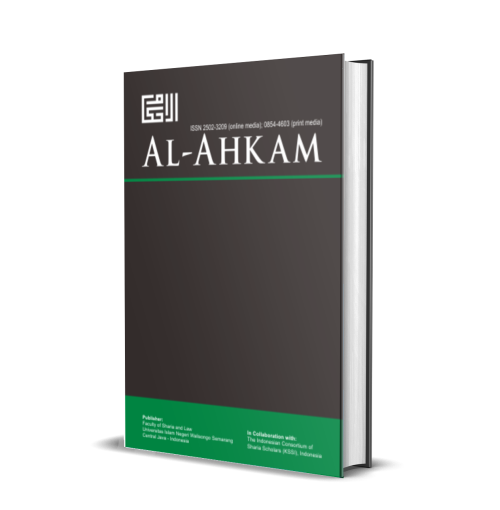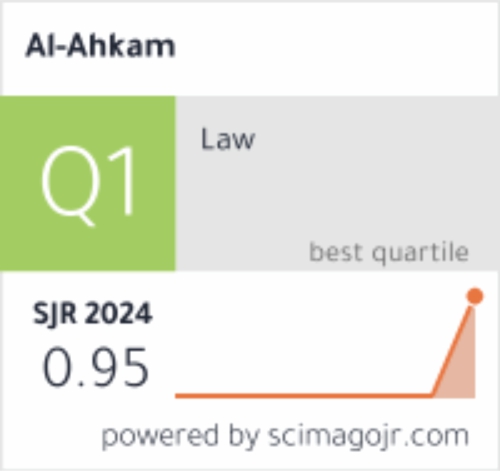From Qitāl to Difā’: The Meaning and Behavior of Jihad according to Jihadists in Semarang City
DOI:
https://doi.org/10.21580/ahkam.2018.18.1.2241Keywords:
jihadists, qitāl, difā’, behavior, meaningAbstract
This paper describes the meaning and act of religion-based jihad according to some jihadists in Semarang city. Insisting that the real meaning of Jihad is qitāl (war, to fight) as said by the verse “La hukma Illa lillah” and hadith “faqtulū haythu wajadtumūhum” they, however, still propose another jihad called difā’ (defensive, to survive) for people who cannot meet the requirement of qitāl. The different act of jihad emerges because of its different factors behind such as social, economy, politics, psychology and others. The shift from qitāl to difā’ takes place by the process of humanizing the jihadists using: 1) personal approach by their morally closest men; 2) basic need approach such as economy, existency and peace; 3) religious approach by understanding that what they do is to fully adhere to Islam (kaffah); 4) emotional approach by caring and giving them empathy; 5) social approach by building solidarity to help their comrades.
[]
Artikel ini mendeskripsikan makna dan perilaku jihad dari para pelaku jihad berbasis agama di Kota Semarang. Makna jihad yang sebenarnya bagi mereka adalah qitāl sebagaimana ayat “la hukma illa lillah” dan hadits “faqtulū haythu wajadtumūhum”, namun jihad difā’ dapat dilakukan bagi yang tidak memenuhi syarat jihad qitāl. Perbedaan perilaku jihad terjadi karena perbedaan faktor yang melingkupinya, yakni faktor sosial, ekonomi, politik, psikologi dan lainnya. Perubahan perilaku jihad (qitāl) menjadi difā’ terjadi karena proses memanusiakan manusia yang dilakukan dengan: 1) pendekatan personil yang dilakukan oleh orang yang dekat secara moril; 2) pendekatan berbasis kebutuhan primer mereka baik ekonomi, eksistensi ataupun rasa aman; 3) pendekatan agama dilakukan dengan memahami apa yang mereka lakukan adalah dalam rangka melakukan Islam secara kaffah; 4) pendekatan emosional dengan memberi perhatian atau empati; 5) pendekatan sosial dengan membangun solidaritas untuk membantu teman-teman seperjuangannya.Downloads
References
Abd. “Interview.” July 15, 2012.
Abidin, Ibn. Radd al-Mukhtār. Beirut: Dār al-Ma’ārif, 2003.
Ahyar, Muzayyin. “Membaca Gerakan Islam Radikal dan Deradikalisasi Gerakan Islam.” Walisongo: Jurnal Penelitian Sosial Keagamaan 23, no. 1 (2015): 1–26. https://doi.org/10.21580/WS.23.1.220.
Ali, Atabik, and Ahmad Zuhdi Muhdlor. Kamus Kontemporer Arab Indonesia. Yogyakarta: Multi Karya Grafika, 1999.
Arkoun, Mohammed, and Robert D. Lee. Rethinking Islam: Common Questions, Uncommon Answers. Edited by Robert D. Lee. Michigan: Westview Press, 1994.
Bonner, Michael. Jihad In Islamic History: Doctrine and Practice. UK: Princeton University Press, 2008.
al-Bukhārī, Abū Abdullāh Muḥammad bin Ismā’īl bin Ibrāhim bin al-Mughīrah bin Barzdabah. Ṣaḥīḥ al-Bukhārī. Beirut: Dār al-Fikr, 1401.
Burhanudin, Asep. Ghulam Ahmad: Jihad Tanpa Kekerasan. Yogyakarta: LKiS, 2005.
Giddens, Anthony. Kapitalis dan Teori Sosial Modern. Jakarta: UI Press, 1986.
Hanafi, Hassan. Islam in the Modern World; Tradition, Revolution and Culture. 2nd ed. Cairo: Dar Kebaa Bookshop, 2000.
Hasani, Ismail, and Bonar Tigor Naipospos. Dari Radikalisme Menuju Terorisme. Jakarta: Pustaka Masyarakat Setara, 2012.
Hilmy, Masdar. Islam Profetik: Substansi Nilai-nilai Agama dalam Ruang Publik. Yogyakarta: Kanisius, 2008.
Hr. “Interview.” June 18, 2012.
Huda, Noor. “Interview.” June15, 2012.
Katz, Samuel M. Jihad: Islamic Fundamentalist Terrorism. Minneapolis: Lerner Publications Company, 2004.
Kepel, Gilles. Jihad: The Trail of Political Islam. London, UK: I.B.Tauris, 2002.
Khadduri, Majid. War & Peace in the Law of Islam: Perang dan Damai & Hukum Islam. Edited by Kuswanto. Yogyakarta: Tarawang Press, 2002.
Kusmanto, Thohir Yuli, Moh. Fauzi, and M. Mukhsin Jamil. “Dialektika Radikalisme dan Anti Radikalisme di Pesantren.” Walisongo: Jurnal Penelitian Sosial Keagamaan 23, no. 1 (2015): 27–50. https://doi.org/ 10.21580/WS.23.1.221.
Lukens-Bull, Ronald Alan. Jihad Ala Pesantren di Mata Antropolog Amerika. Edited by Abdurahman Ma’ud. Yogyakarta: Gama Media, 2004.
Miswari, Zuhairi. “Islam dan Terorisme.” Islam Lib, 2002. http://islamlib.com/ politik/radikalisme/islam-dan-terorisme/.
Mulkhan, Abdul Munir. Manusia Al-Qur’an: Jalan Ketiga Religiousitas di Indonesia. Yogyakarta: Kanisius, 2007.
Poerwadarminta, W.J.S. Kamus Umum Bahasa Indonesia. 3rd ed. Jakarta: Balai Pustaka, 2006.
Qardhawi, Yusuf. Fiqh Jihad: Sebuah Karya Monumental Terlengkap tentang Jihad Menurut Al-Qur’an. Bandung: Mizan Publika, 2010.
Rahman, Fazlur. Tema Pokok Al-Qur’an. Bandung: Pustaka, 1983.
Rohimin. Jihad: Makna dan Hikmah. Jakarta: Erlangga, 2007.
Rumadi. Renungan Santri; Dari Jihad Hingga Kritik Wacana Agama. Jakarta: Erlangga, 2006.
Schroeder, Ralph. Max Weber tentang Hegemoni System Kepercayaan. Edited by Ratna Noviani. Yogyakarta: Kanisius, 2002.
Sulasman, Sulasman. “Peaceful Jihād dan Pendidikan Deradikalisasi Agama.” Walisongo: Jurnal Penelitian Sosial Keagamaan 23, no. 1 (2015): 151–76. https://doi.org/10.21580/WS.23.1.228.
Tim Redaksi Kamus Besar Bahasa Indonesia. Kamus Besar Bahasa Indonesia. 3rd ed. Jakarta: Balai Pustaka, 2005.
Warson, Ahmad. Kamus Arab-Indonesia Al-Munawir. Surabaya: Pustaka Progressif, 1997.
Yusuf. “Interview.” June 12, 2012.
Downloads
Published
How to Cite
Issue
Section
License
By submitting an article to the journal, the author(s) agree to transfer the published article's copyright to the journal, which will act as the publisher. This means the journal will have the right to publish the article in various forms, including reprints. The journal will maintain the publishing rights to the published articles.
In line with the license, authors and third parties (readers, researchers, and others) are allowed to share and adapt the material. In addition, the material must be given appropriate credit, provided with a link to the license, and indicated if changes were made. If authors remix, transform or build upon the material, authors must distribute their contributions under the same license as the original.




